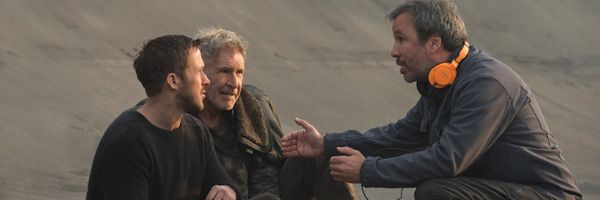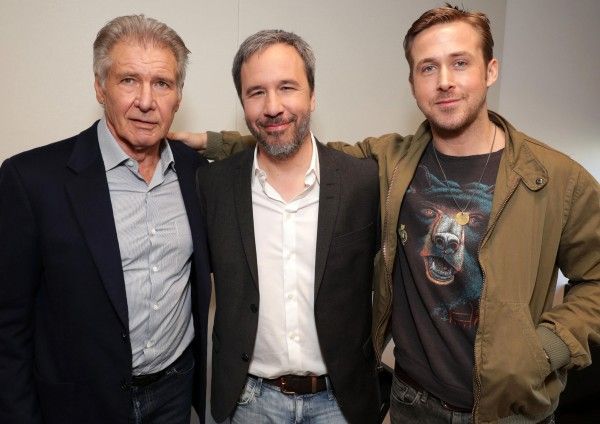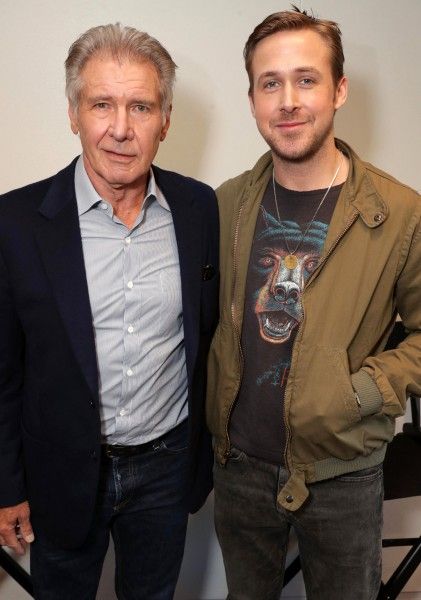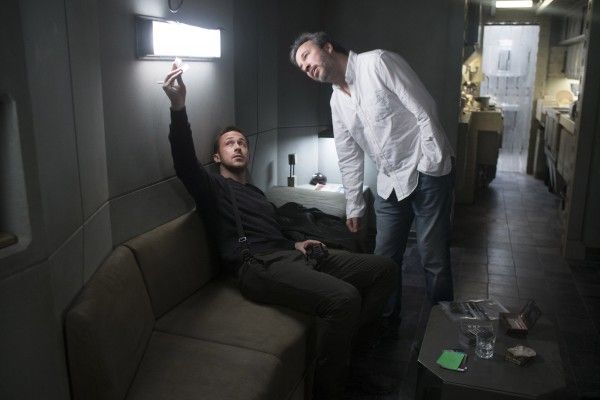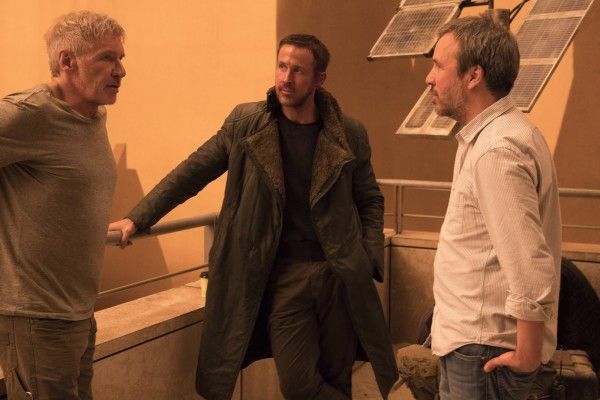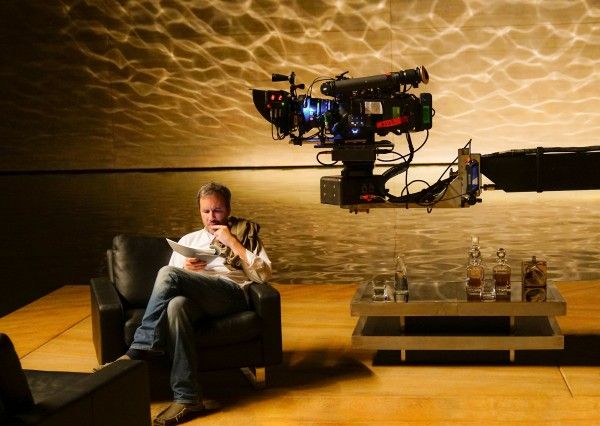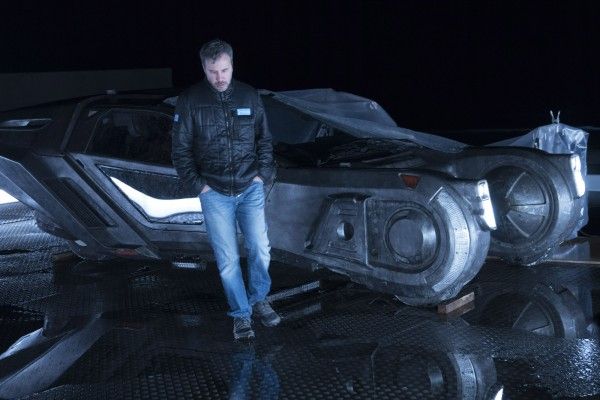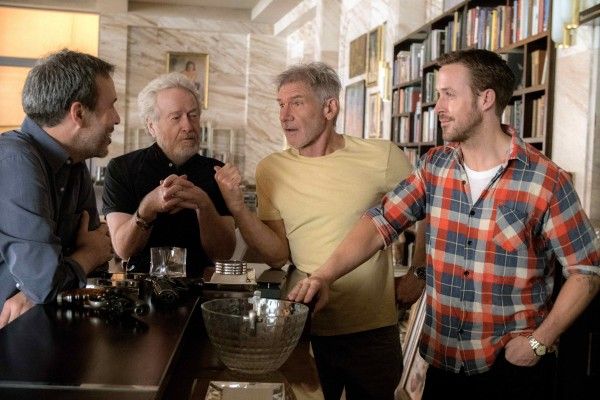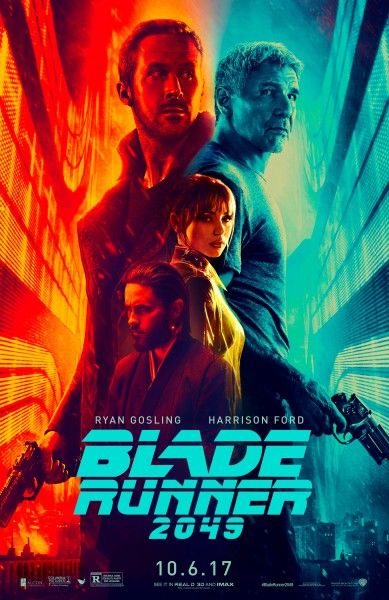From director Denis Villeneuve, the sci-fi thriller Blade Runner 2049, the much-anticipated sequel to the 1982 masterpiece from Ridley Scott, follows LAPD Officer K (Ryan Gosling), who unearths a long-buried and very dangerous secret that has the potential to turn everything into chaos. That discovery leads him on a quest to find Rick Deckard (Harrison Ford), a former blade runner that may be the only one left with the answers everyone seems to be seeking.
At the ultra secretive film’s press junket, co-stars Ryan Gosling and Harrison Ford, along with filmmaker Denis Villeneuve, spoke in very general terms about their experience, so as not to ruin the story’s surprises. During the interview, they spoke about the pressures of making this film and living up to the standard set with the original, the themes they were most interested in exploring, getting Ridley Scott’s blessing, developing such non-traditional characters, and the importance of collaborating with cinematographer Roger Deakins.
Denis, the first Blade Runner set a standard in the genre, and it’s even preserved in the National Library of Congress. What kind of pressure did you feel, in doing this film?
DENIS VILLENEUVE: The good news is that I’m Canadian. The movie is a national treasure for the United States. It’s a movie that had a huge impact on me, for several reasons, when I saw it in the theater. I was a young teenager and I was hungry for strong science fiction. When I saw Blade Runner, it was certainly a movie that really impressed me, for a lot of reasons. One of them is that, at the time, I was starting to dream about the idea of directing movies. We can all agree that Blade Runner is a very strong example of what a movie can do when it’s in the hands of an auteur. It’s a director’s movie. The imprint of Ridley was very powerful. It inspired so many movies after. So, how can you revisit a universe that has inspired so many movies after? That was a big challenge, making sure that we go back there with fresh eyes. There was a necessary space for a director to bring his own imprint. The screenplay was a huge help, and I revisited all of the drafts, from Michael [Green] and from Hampton [Fancher] . It became my bible.
What are some of the things that you were most interested in exploring, thematically, with this?
VILLENEUVE: The idea that, as human beings, we are programmed by our genetic background and our education is inherent in the project. Also, I wanted to bring back that beautiful melancholia from the first movie and explore it with my own sensibility.
Why was it so important for you to have the blessing of Ridley Scott, who directed the first film and is an executive producer on this. How did you get that blessing from him?
HARRISON FORD: You usually know when Ridley is not happy with you.
VILLENEUVE: When (Producer) Broderick [Johnson] organized the meeting, right from the start, I said, “Okay, I’ll do it, but one my conditions is that I need to be in the same room with Ridley Scott and have him say that it is okay for me to take the baton, or to get behind the wheel.” At the time, Ridley was too busy to do it. Basically, while in the room, I told him, “It’s simple, give me your blessing. If you don’t, I’ll walk out and I’m not doing the movie. For me, there’s no in between. If it’s okay with you or if it’s not, I’ll be at peace with that.”
Ryan, you’ve never done a movie like this before, in this genre. What did the role of K allow you to do that you hadn’t done before?
RYAN GOSLING: It was a very unique opportunity. It’s such a wildly unique film. When I first saw it, I was 12. It had been out for 10 years. I thought I was just watching a science fiction movie, but what I experienced was something very different. What’s interesting about the film is not just the experience of watching it, but how it stays with you. I wasn’t asking myself, at 12, what it meant to be a human being. I was after that, maybe subconsciously, that those seeds were planted. I realized how much influence it had on the culture I grew up in. Then, to read a script that was a love letter, in certain ways, to the original, but was also very much its own thing. It was respectfully carrying out the narratives and themes of the original, but at the same time, introducing its own conceptual ideas. It was still massive in scale, but at the same time, it was intimate, personal and emotional. This is an experience that’s unique to Blade Runner. It was a wonderful opportunity for me to be a part of something very unique.
What was it like to work with Harrison Ford on this?
GOSLING: He arrived in a very cinematic way. We heard that Harrison had landed. We heard that Harrison was coming to set. We heard that Harrison had arrived. It was very darkly lit. You could only distinguish people by their silhouette. Suddenly, this very distinctive silhouette appeared. He stepped into the light and looked at me like I was an eight-year-old kid who just broke his window, and then immediately put us at ease. He’s the best collaborator you could ever ask for, and he with him the experience and the intent of making something great. We all felt that, and we felt like we could really begin to do that.
When you take on what is a legacy film, what are the priorities that you establish for yourself, to make sure that legacy is protected?
GOSLING: First of all, Harrison, Ridley and Hampton all agreed and decided that this was the time to make the film, that this was the story to tell, and that this was the way that the narrative and the world would have evolved. So, who am I to argue with that? The question I asked myself, after that was, when you read the screenplay, is there a story to be told here? Does it stand on its own? Is there something useful and worth all this effort? There was no doubt in my mind, after reading it, that those things were true. Then, you get Denis Villeneuve, Roger Deakins, this incredible cast, and the incredible craftsmen in Budapest that were building these environments, and it just kept expanding. There were so many great storytellers manning the helm. Story was paramount, on set. All the aesthetic choices came from story and character. It just instilled a great amount of confidence in me, and I felt very challenged by it, but excited by the opportunity.
Harrison, this film and the first film stand out because they’re so visually stimulating and stunning. As an actor, how important is that for you, in getting into the character, to have that visual impact there, as far as sets and everything?
FORD: A picture is worth a thousand words, and when you get on a set where there’s been a lot of thought put into the visual aspects of that scene, you feel a sense of support and you know what you don’t have to do. You have to be there, of course, for the other characters and to service the story, but so much is done in a visual way. It certainly encourages your confidence.
When you think back to the first Blade Runner film, do you have vivid memories of filming it?
FORD: It was raining. I was tired. I was happy with the eventual movie. A lot has happened since then, but it was a remarkable experience, working with Ridley [Scott]. But it was a long time ago, in a world far, far away.
Did the story have to be right for you to be willing to return as Deckard?
FORD: I was looking for an opportunity to extend the audience’s understanding of the character and to be part of the telling of the story. The whole of it had to be something that I really wanted to be involved in, and not just my part. I saw that potential. I also was anxious to work with the people involved – with Denis and with Ryan. So, for me, it was a great opportunity.
The characters are very complex and interesting. Denis, how was the process of developing the characters, in terms of talking with the actors? And as actors, how did you approach playing such non-traditional characters?
VILLENEUVE: What was different in this movie was to start with somebody else’s dream, at the beginning. I was playing with the ideas of Ridley Scott and Hampton Fancher. One of the toughest things for me, with this project, was to bring back Rick Deckard, Harrison’s character. To my great relief, right from the start, I felt that Harrison wanted to be a part of the creative process and to help me. I would not have been able to do it alone. I needed a collaboration and a dialogue. I think it’s a dialogue that evolved through time. At the beginning, there was a long period of silence and uncertainty, in regard to how to be bringing this character back to life. What will his mental state be, when he’s been away from our eyes for 30 years? It’s a process. With all the actors, it’s always the same. I love to create with actors. I love to share. I don’t know if they agree, but that’s my goal. My goal is to share creativity with them, as much as possible. I think that’s what I tried to do with them, and specifically with Harrison. It was crucial, more than ever.
FORD: I would say that there was a period of questioning, with how much of the story to tell and what story do you tell, in that space between the last time you saw Deckard and when you see him now. What condition do we find him in? I found it a real pleasure to work with Denis’ imagination and to have him respect the process, and we ended in a place that I hope serves the film well. But, I was also anxious.
Denis, your movies look beautiful, and much of that is your collaboration with the god of cinematography, Roger Deakins. How did you go about capturing the look of the original film while injecting your own look, in collaboration with your D.P.?
VILLENEUVE: Right from the start, these were big shoes to fill. When I said yes, I said, “I need to surround myself with very strong artists.” The first thing I did, that same day, was that I had dinner at Roger’s house and asked him to get on board with me, and he said yes, right away. Roger and I were dreaming about doing a science fiction movie together. The big difference with the movies I have done before is that, this time, I brought Roger into the process, very early on. We started to have working sessions in Montreal. We spent a few months in Montreal, in a hotel room with two storyboard artists. We drew the whole movie together – all the storyboards. We designed the movie together. We figured out the laws. The screenplay gave us hints about what the world would be and where we needed to get more specific. Then, Dennis Gassner, the production designer, joined us. In those Montreal sessions, we created what would be the defined laws, from a sociologic, economic, geopolitical, climate and architecture point of view. Everything was designed in those working sessions with Roger, and I’m really grateful for that. I made the movie with him, from day one.
The ending of the original Blade Runner is one of the all-time classic endings. Harrison, what did you think of the original ending?
FORD: First of all, there were a variety of endings. It ended with Ridley’s final cut. I was much happier with that version.
How often had you thought about Deckard and where Deckard might be, over these past 30 years?
FORD: I’ve thought about it frequently because I’ve been reminded of how many filmmakers took inspiration from that film, how much it defined a certain kind of visual storytelling, and how strong the effect of that film has been on our culture. It’s had a huge influence on our culture and my life.
Blade Runner 2049 opens in theaters on October 6th.

